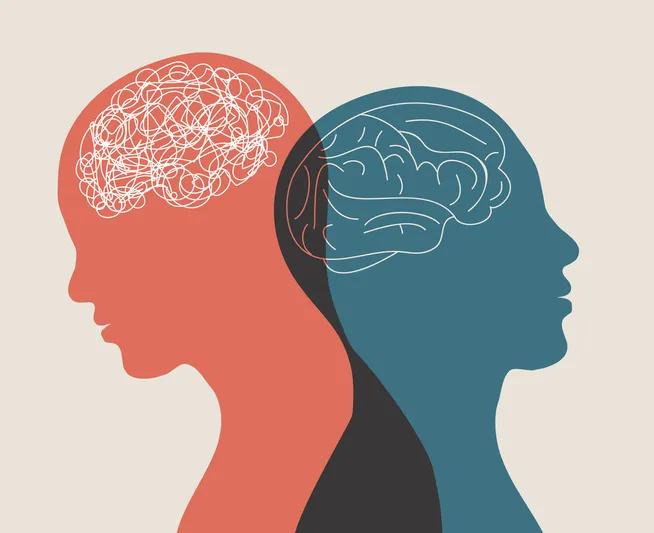Part 1
Mental diseases can be a real pain in the brain, but don’t worry, I’m here to break it down for you. In this blog, we’ll delve into the fascinating world of mental diseases and try to make sense of it all. Buckle up, because we’re about to take a deep dive into the mind.
From understanding the definition and explanation of mental diseases to exploring the different types that exist, we’ll explore it all. Along the way, we’ll uncover the common symptoms, including emotional and behavioral changes, as well as cognitive impairments. Trust me, your mind is in for a wild ride!
But what causes these mental diseases, you ask? Well, we’ll explore the biological, psychological, and environmental factors that play a role in their development. It’s a complex web of elements, all contributing to the brain chaos.
Luckily, there’s hope! We’ll discuss the importance of seeking professional help, the different therapeutic approaches available, and even touch on medications that can help ease the burden. No worries, we’ve got backup plans for your brain.
Unfortunately, society isn’t always kind to those with mental diseases. We’ll tackle the stigma surrounding mental illnesses and shed some light on the misconceptions that often prevail. Prepare for some eye-opening moments.
In conclusion, understanding mental diseases isn’t easy, but it’s a journey worth taking. So, sit back, relax, and let’s unravel the mysteries of the mind together. Trust me, your brain will thank you later.
What is a Mental Disease?
Have you ever met someone who has an uncanny ability to make you question your own sanity? No? Lucky you! Well, for those of us who have encountered such individuals, we might blame it on a mere personality quirk, but it could actually be something more serious.
Yes, my friends, it’s time to dive into the perplexing world of mental diseases.
So, what exactly is a mental disease? Well, it’s like having a rollercoaster ride inside your brain, where emotions and thoughts go round and round, making you wonder if you’ve accidentally stumbled into a wacky theme park.
In simple terms, mental diseases are disturbances in the normal functioning of the brain, impacting a person’s emotions, thoughts, and behavior.
But, let’s not pretend that mental diseases are all cut from the same cloth. Oh no, my friends, they come in various shapes and sizes. It’s like a mental smorgasbord out there! You have depression, anxiety disorders, schizophrenia, bipolar disorder, and oh so many more to choose from. It’s like a never-ending array of options, except these are the kinds of choices no one really wants to make.
Each type of mental disease brings its own unique set of challenges to the table. Depression likes to serve up a nice plate of sadness with a side of hopelessness, while anxiety disorders offer up a buffet of panic attacks, excessive worrying, and a sprinkle of irrational fears. Schizophrenia adds some auditory and visual hallucinations to the mix, just to keep things interesting.
So, the next time you meet someone who seems to be experiencing emotions that could give a soap opera a run for its money, take a moment to consider that they might be dealing with a mental disease. And hey, let’s try not to judge them too harshly. After all, we all have our own quirks, right? It just so happens that theirs are a bit more extraordinary.
Common Symptoms of Mental Diseases
Ah, mental diseases. They’re like a rollercoaster ride of emotions and cognitive impairments. Fun, right? Well, maybe not so much. But hey, let’s dive into the common symptoms of these delightful conditions, shall we?
First, we have emotional and behavioral changes. It’s like your emotions decide to have a rave party without your permission. One minute you’re all happy-go-lucky, and the next, you’re sobbing into your pillow for no apparent reason. It’s a wild ride, my friends.
And let’s not forget about the cognitive impairments. Your brain decides to play a little game of hide-and-seek, making it difficult to concentrate, remember things, or even make simple decisions. It’s like your thoughts are on vacation in the Bermuda Triangle.
But wait, there’s more! Mental diseases can also bring along other lovely symptoms like changes in sleep patterns, appetite fluctuations, and even physical ailments. Your whole body gets invited to this not-so-exclusive party.
Now that we know what we’re dealing with, let’s talk about the causes of these mind-bending conditions. Biological factors, psychological factors, and environmental factors all take turns playing the blame game. It’s like a dysfunctional family reunion where everyone’s pointing fingers.
Seeking professional help is crucial when it comes to diagnosis and treatment. Therapeutic approaches, like therapy and counseling, aim to help you navigate through the maze of your mind. And if necessary, medication can give your brain a little boost.
Unfortunately, there’s still a stigma surrounding mental diseases. People tend to give you strange looks or make ignorant comments as if mental health is some kind of mystical unicorn instead of a real and serious issue. But hey, we’re making progress, one sarcastic comment at a time.
So, there you have it – a glimpse into the world of mental diseases. Remember, you’re not alone on this rollercoaster ride, and seeking help is a sign of strength, not weakness. Stay quirky, my friends!
Causes of Mental Diseases
Ah, the intricate world of mental diseases! Quite a fascinating topic, isn’t it? Well, let’s dive right in and explore the causes behind these mysterious conditions.
Firstly, we have the biological factors. Yes, our lovely genetics plays a part here. It’s like a lucky dip where you might win a predisposition to mental diseases. Thanks, DNA! These biological factors can include chemical imbalances in the brain or structural abnormalities. You know, just your typical genetic surprises.
But wait, there’s more! Psychological factors also have a role to play. Stress, trauma, and even your charming personality can contribute to the development of mental diseases. It’s amazing how our thoughts, emotions, and past experiences can intertwine to create a lovely little mental cocktail of problems. Cheers to that!
Oh, and let’s not forget about the environmental factors. The world around us can be quite influential, you know. Growing up in a toxic environment, experiencing social isolation, or having limited access to resources can add fuel to the fire. Society, you really know how to make things interesting!
So there you have it, the delightful factors contributing to mental diseases. Biology, psychology, and the environment all get their chance to shine in this chaotic parade of causes. It’s truly an orchestra of madness!
Remember, though, each individual is unique, and these factors interact in different ways for everyone. So, if you ever find yourself dealing with a mental disease, just remember that you’re part of this captivating journey called life. Hang on tight, embrace the quirks, and know that you’re not alone in this beautifully chaotic world.
***
Part 2
Diagnosis and Treatment
Seeking professional help is the first step towards addressing mental diseases. I mean, let’s be real, you wouldn’t go to a plumber if your car needed fixing, right? Similarly, you need to consult a mental health professional who knows their stuff. These experts have the knowledge and experience to understand your unique situation and provide appropriate guidance.
But hey, seeking help doesn’t mean you’re weak or “crazy” as society puts it. In fact, it takes a lot of courage to admit that something’s not right and ask for assistance. Plus, it’s always better than trying to figure it out on your own, relying on questionable Dr. Google and his unreliable advice.
Now, when it comes to therapeutic approaches, there isn’t a one-size-fits-all solution. It’s like finding the right pair of jeans—sometimes you have to try on a few to see which one fits best. Therapy can involve various techniques like cognitive-behavioral therapy (CBT), dialectical behavior therapy (DBT), or even art therapy.
Another option in the mental health toolkit is medication. Yes, folks, they’ve got pills to help tackle mental diseases. Just like taking antibiotics for a physical illness, medication can help balance out those wonky brain chemicals. And don’t worry, you won’t turn into a zombie or lose your personality; modern medicine has come a long way from the days of straitjackets and asylums.
So, let’s simplify it: if you think you might be experiencing a mental disease, reach out to a professional who knows their stuff. They can recommend therapeutic approaches that are tailored to your needs and, if necessary, consider adding medication to the mix. Remember, it’s not a weakness, it’s just getting the help you need to live your best life. Who doesn’t want that?
Stigma Surrounding Mental Diseases
Ah, the good old stigma surrounding mental diseases. It’s like a dark cloud looming over anyone who dares to speak up about their struggles. Society’s way of saying, “Hey, let’s not talk about it and pretend it doesn’t exist!” Because, you know, mental health is just a myth, right?
But seriously, the stigma attached to mental diseases is a real problem. It prevents people from seeking help, opening up, and getting the support they need. We live in a world where physical illnesses get all the attention and sympathy, while mental illnesses are pushed aside, almost like they’re contagious.
It’s high time we break this stigma and treat mental diseases with the same understanding and compassion as any physical ailment. Let’s create an environment where people feel safe to share their experiences without the fear of being judged or labeled as “crazy.”
Remember, mental health matters, and no one should be made to feel ashamed for seeking help. It’s time to flip the script and rewrite the narrative surrounding mental diseases. Together, we can create a more accepting and supportive world for everyone struggling with their mental health.
Conclusion
So, we’ve reached the end of this wild ride on Understanding Mental Diseases. Let’s quickly recap what we’ve learned, shall we?
Firstly, mental diseases are no joke. They come in various forms, each with its own set of symptoms. Emotional and behavioral changes are common markers, along with cognitive impairments that mess with your thinking and memory.
Moving on to the causes, there’s a whole cocktail of factors at play. Biological factors, psychological factors, and good old environmental factors all join forces to mess with your mind. Thanks, universe!
But fret not, my friends, for there is hope. Seeking professional help is crucial for diagnosis and treatment. Therapeutic approaches and medication can help guide you through the stormy seas of mental diseases.
Now, let’s address the elephant in the room: the stigma. Society has a knack for making things harder, and mental diseases are no exception. But hey, we’re breaking down those walls one blog post at a time, right?
And there you have it, folks. Our journey through the rollercoaster world of mental diseases has come to an end. Remember, it’s important to talk about these things, support each other, and seek help when needed.
Keep shining bright, you amazing humans!





 طراحی سایت آکسایا )
طراحی سایت آکسایا )